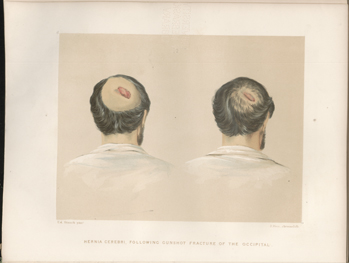Title: Kennedy, Charles
Source text: Surgeon General Joseph K. Barnes, United States Army, The Medical and Surgical History of the War of the Rebellion. (1861–65.), Part 1, Volume 2 (Washington, D.C.: Government Printing Office, 1870), 294-295.
Civil War Washington ID: med.d1e17135
TEI/XML: med.d1e17135.xml
CASE.—Lieutenant Charles Kennedy, Co. I, 28th Pennsylvania Volunteers, aged 25 years, was wounded at the battle of Chancellorsville, Virginia, May 2d, 1863, by a fragment of shell, which produced a wound two inches long and one inch wide, removing the superior portion of the occipital bone one inch to the right of the median line, destroying the membranes so that the substance of the brain protruded about one and a half inches. On May 7th, he was admitted to Armory Square Hospital, Washington. The wound had a burnt and black appearance, and the pulsation of the brain was very distinct with every beat of the heart. The patient's intellect was greatly impaired, and there was total loss of vision, so that he could not distinguish day from night. The pulse was at 60 and full, and there was partial loss of power in the lower extremities. After admission to hospital, the hair was closely shaven around the wound, and the dead tissue was removed by sponging with tepid water. His bowels were constipated for seven days from the date of the injury, and he had scarcely any sleep. Cathartics, injections, and anodynes were administered. On May 11th, twelve leeches were applied to each temple, and three behind each ear. On the following day the symptoms were greatly ameliorated. On May 13th, spiculæ of bone were removed, and also on the 15th, when the fungus had receded somewhat, and a healthy granulation was progressing. His appetite was good, no fever, vision partially restored, and able to get out of bed. He continued to improve, and on June 16th the fungus had entirely retracted, and vision was restored. The intellect was perfect and the general health good. On June 20th, Lieutenant Kennedy went home on leave of absence. He was subsequently admitted to the Officers' Hospital at Philadelphia. On September 9th, 1863, the wound had entirely healed. On November 12th, he was ordered before an examining board at Annapolis, and was returned to duty January 12th, 1864. On May 5th, 1864, he was admitted to the field hospital at Lookout Mountain, being again returned to duty about July, 1864. He was discharged the service July 20th, 1864, and afterward pensioned. Pension Examiner Wilson Jewell, under date of April 19th, 1865, reported that the patient suffers from cephalalgia, vertigo, and weakness, when exposed to the sun or much excited. His disability was rated one-third and temporary. It was subsequently stated by Dr. C. C. McGlaughlin, late surgeon 95th Pennsylvania Volunteers, that he attended Lieutenant Kennedy in his last illness, and that he died December 15th, 1865, from the effects of a wound in his head. The plate opposite illustrates the appearance of the wound in May and June, 1863.


